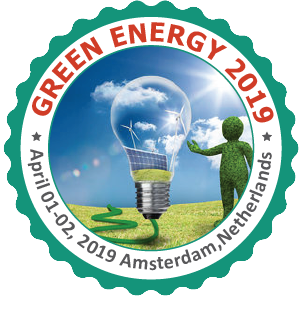International Conference on Green Energy
Amsterdam, Netherlands

F.M. Baena-Moreno
University of Seville, Seville, Spain
Title: Complete physicochemical characterization of PCC from a biogas upgrading unit
Biography
Biography: F.M. Baena-Moreno
Abstract
In order to contribute to the reduction of CO2 emissions both by capturing it and producing clean and renewable fuels, it was investigated a potential strategy for biogas upgrading and calcium carbonate production (Baena-Moreno et al. 2018). This proposed process consisted on capturing CO2 from biogas by means of chemical absorption with NaOH, giving as main product Na2CO3. Regenerating the solvent agent with traditional physical processes, such as increasing temperature, has a high impact in the overall energy consumption. For this reason, an alternative regeneration path was proposed. In this process, NaOH was regenerated from Na2CO3 by chemically reacting with Ca(OH)2, hence CaCO3 was obtained as main product. This type of CaCO3 is known as Precipitated Calcium Carbonate (PCC). In the previous work, a complete study of the parameters effect on NaOH regeneration efficiency was treated, as well as a brief physicochemical characterization of the product obtained to ensure the carbonate phase reached. In this work, nn exhaustive physicochemical characterization of calcium carbonate obtained in the biogas upgrading plant is presented. The physicochemical characterization was carried out by means of Fourier-transform infrared spectroscopy (FTIR), Raman spectroscopy, X-ray Powder Diffraction (XRD) and Scanning Electron Microscope (SEM). The results reveal that a valuable product can be obtained in this proposed biogas upgrading plant unit. Nevertheless, the physicochemical characterization techniques confirm that PCC obtained presents a calcite structure with a polymorph mixture form. Thus, a higher quality product could be obtained by means of other methods or operational conditions.

